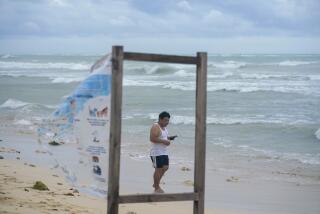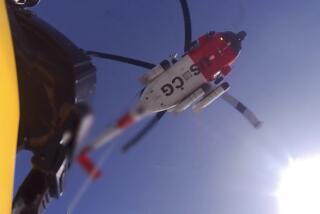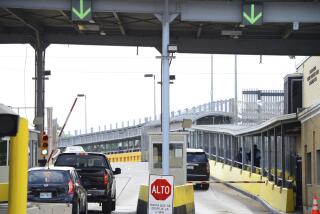Mexico bans cruise ship with Texas passenger under Ebola watch
Mexican authorities, concerned with the spread of Ebola, have banned a Carnival cruise ship carrying a Dallas healthcare worker who is in isolation on the ship but showing no symptoms of the virus, Carnival officials said Friday.
The ship was not allowed to dock in Cozumel, forcing the cruise line to reroute its trip and return to Galveston, Texas.
------------
FOR THE RECORD
An earlier version of this post identified the operator of Texas Health Presbyterian Hospital as Texas Health Services. It is Texas Health Resources.
------------
The lab supervisor aboard the Carnival Magic worked at Texas Health Presbyterian Hospital where two nurses contracted Ebola from a Liberian man who died of the virus. Her voluntary isolation from other passengers was taken out of “an extreme abundance of caution,” the cruise line said Friday.
“We greatly regret that this situation, which was completely beyond our control, precluded the ship from making its scheduled visit to Cozumel and the resulting disappointment it has caused our guests,” the cruise line said in a statement.
The healthcare worker has shown no symptoms of the disease, according to the U.S. Centers for Disease Control and Prevention and Carnival Corp.
The U.S. State Department said it is working with Carnival to bring the woman and her travel companion back to the U.S.
“At this time, the guest remains in isolation on board the ship and is not deemed to be a risk to any guests or crew. It is important to reiterate that the individual has no symptoms and has been isolated in an extreme abundance of caution,” Carnival said.
Carnival, the world’s largest cruise company, noted that it has already rerouted other cruise ships that were scheduled in the future to stop in ports in West Africa and will deny boarding to Liberia, Sierra Leone or Guinea in the last 21 days.
Meanwhile, Nina Pham, one of the two Texas nurses who were infected with Ebola, is in fair condition, “stable and resting comfortably” and is receiving intensive care in a specially equipped isolation ward at the National Institutes of Health near Washington, officials said Friday.
“We will have her here until she is well and clear of the virus,” said Dr. Anthony S. Fauci, head of the National Institute of Allergy and Infectious Diseases.
Pham is one of two Dallas hospital nurses who were infected with Ebola after caring for the first patient in the U.S. to be diagnosed with the deadly virus. The second nurse, Amber Vinson, is being treated in Atlanta.
Pham, 26, arrived late Thursday night at the NIH in Bethesda, Md. According to Fauci, Pham is sitting up, eating and interacting with the staff.
Fair condition implies that Pham still has some symptoms, Fauci said during a televised news conference.
“She’s here. We’re responsible for her. That’s our job,” Fauci said.
Fauci declined to give a prognosis, but told reporters: “We fully intend to have this patient walk out of this hospital.”
Pham was among the healthcare workers, including fellow nurse Vinson, who had contact with Liberian Ebola patient Thomas Eric Duncan. His Ebola diagnosis was announced by the CDC on Sept. 30 and he died Oct. 8 at the hospital.
Officials siad the woman on the Carnival ship did not have “direct contact with the since-deceased Ebola patient, but may have had contact with clinical specimens collected from him,” said a U.S. State Department statement.
Tom Skinner, a spokesman for the CDC, said that at the time of her departure on the cruise, the lab supervisor had been among those only required to monitor themselves for any signs or symptoms of Ebola infection.
“At the time that she left, she wouldn’t have been required to seek permission to leave,” he said. “She would’ve just been required to self monitor.”
Around the time she left, the CDC and local health officials were switching from the self-monitoring rules, which had no travel restrictions, to more active monitoring of the dozens of healthcare workers who could have come into contact with Duncan or potentially contaminated materials.
Two other Dallas hospital workers, who had traveled abroad and returned, had been asked to monitor themselves for signs or symptoms of Ebola, said CDC spokesman Skinner. He said that they had not been under the travel restrictions that are now in place for those who may have been exposed to the virus at Texas Health Presbyterian Hospital Dallas.
“There were two other individuals that traveled abroad but are now back, and they both are not sick either nor have they been sick.” Skinner said.
A statement from Texas Health Resources, the operator of the hospital, said specimens taken Sept. 25 during Duncan’s first visit to the emergency room were not handled any differently from other samples. They were bagged and placed in a sealed container that then was sent to the lab through the hospital’s pneumatic tube delivery system.
“There was no spillage of Mr. Duncan’s specimens,” the statement said.
When Duncan returned three days later, lab samples were triple-bagged and placed in a transport container that was carried to the lab.
Specimens collected from the intensive care unit likewise were sealed and hand carried, while more routine tests were done in his room “via wireless equipment,” the hospital statement said.
Mohan reported from Dallas, Martin from Los Angeles. Time staff writer Molly Hennessy-Fiske contributed to this report from Dallas
More to Read
Sign up for Essential California
The most important California stories and recommendations in your inbox every morning.
You may occasionally receive promotional content from the Los Angeles Times.












